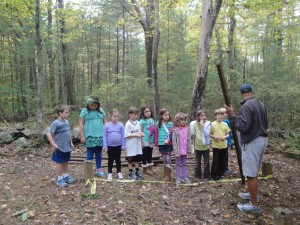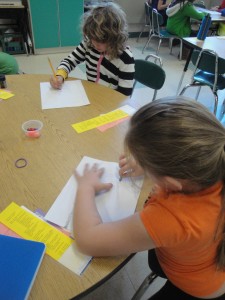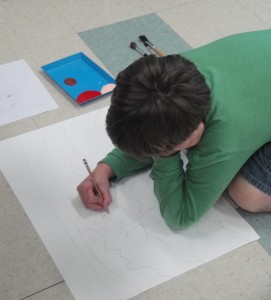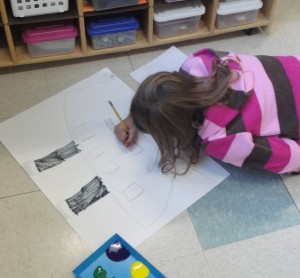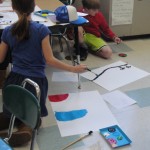It has been another start and stop week. The testing is two thirds done and your children have been amazingly patient, resilient and thoughtful. Yesterday’s math test was a zinger. The way the questions were worded left many children across the grade confused and befuddled. You would have been proud of their persistence and effort. Please give them a hug and thank them for their efforts.
Social Emotional Learning
This week we were able to work through a challenging puzzle that required self-control, creativity, cooperation and focus. The Muse is a challenge that demands thought as well as action. In the challenge there are notched stumps and lengths of board that fit from one stump to the next. The goal is to create at least one path from the supply area to the end so the entire class can cross on the path.
Our class was excited to build the path and committed to finding as many options as possible. They worked carefully and cooperatively. Once a path was built, they thought of creative ways to help the entire class cross safely. It was an excellent way to end our day – with a blast of success and fun.
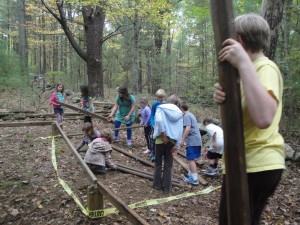 Continuing to Describe How We Are Smart
Continuing to Describe How We Are Smart
Social Emotional Learning
We have completed our pie graphs of how we are smart. All eight sections have been defined, labeled and colored in. The next step of this project will be describe what we do and how we know about our strengths as thinkers, doers and learners. We are discovering that our brains stretch and grow. In the book The Fantastic, Elastic Brain the author compares learning to play soccer with developing connections and growing capacities in our brains. At first you can’t kick very far or with much strength but with practice your abilities grow. The same is true when developing neuron connections in the brain. That description made a lot of sense to the class.
We have discussed how we think of ourselves now is not fixed. We can always develop and strengthen abilities that we do not use much at this point. We know that how we are smart can change depending on our goals and our focus. If you are interested in reading more about this Carol Dweck has studied and written about mind set and how attitude impacts success. It is interesting to consider the difference between a fixed mind set and a growth mind set. Adults have a great impact on how children see themselves and their capabilities. It is challenging to support the development of a growth mind set by offering precise feedback and support about process rather than the outcome.
Working Through the Steps of Scientific Inquiry
We began with a question: What will happen when we drop raisins into ginger ale. Next we developed a hypothesis or prediction. Many in our class thought the raisins would sink. Some thought they would dissolve. Still others thought they would break apart. Once our predictions had been recorded we conducted the experiment and observed. Our final step was to record our observations and state a conclusion.
We learned that observing a process is different from observing a thing because there are changes over time – some occur quickly and some occur slowly. We also learned it can be a challenge to use accurate and clear language to scientifically describe what we are observing. We are learning that the language of a scientist is different from that of a storyteller. It is interesting to compare the two voices and to work at developing both. That is what we will be working on over the next week or two.
Leads and Conclusions
As part of our narrative writing project we are learning about leads and conclusions. We are sharing a wide variety of picture books and stories to help us develop a sense of the choices that authors make, first to draw the reader in and then to leave them satisfied at the end. It can be challenging to consider choices. In general our class likes to be “right” from the start so learning to play around and try something one way and then another way doesn’t feel that comfortable. We are learning though that being flexible and considering options might be messy at the start, but can lead to a stronger outcome if we are willing to consider options. This will be a process for sure as we work to build writing skills.
Bits and Pieces
- This week we met Mrs. Moriotti and learned about the role of a counselor in our school.
- We began a new chapter read aloud, Marty McGuire by Kate Messner. We are hoping to connect with another third grade class somewhere in the country who is also reading this book as part of the Global Read Aloud Project.
- We are thinking about the purpose for our writing and the audience as well.
